2019仁爱英语九年级下册知识点
2019年仁爱英语九年级下unit 5 topic 2 he is really the pride of china.(经典归纳)
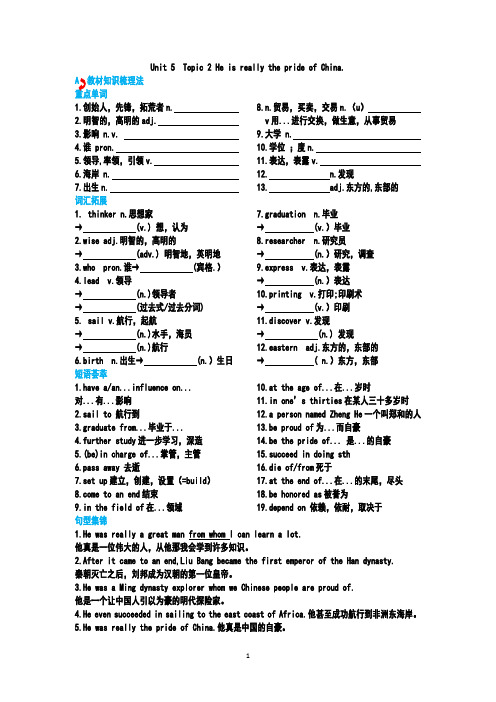
Unit 5 Topic 2 He is really the pride of China.1.创始人,先锋,拓荒者n.2.明智的,高明的adj.3.影响 n.v.4.谁 pron.5.领导,率领,引领v.6.海岸 n.7.出生n.8.n.贸易,买卖,交易n.(u )v 用...进行交换,做生意,从事贸易9.大学 n.10.学位 ;度n.11.表达,表露v.12. n.发现13. adj.东方的,东部的词汇拓展1. thinker n.思想家 → (v.) 想,认为2.wise adj.明智的,高明的 → (adv.) 明智地,英明地3.who pron.谁→ (宾格.)4.lead v.领导 → (n.)领导者 → (过去式/过去分词)5. sail v.航行,起航 → (n.)水手,海员 → (n.)航行6.birth n.出生→ (n.)生日7.graduation n.毕业→ (v.)毕业8.researcher n.研究员→ (n.)研究,调查9.express v.表达,表露→ (n.)表达10.printing v.打印;印刷术→ (v.)印刷11.discover v.发现→ (n.) 发现12.eastern adj.东方的,东部的→ ( n.)东方,东部短语荟萃1.have a/an...influence on... 对...有...影响2.sail to 航行到3.graduate from...毕业于...4.further study 进一步学习,深造5.(be)in charge of...掌管,主管6.pass away 去逝7.set up 建立,创建,设置(=build )e to an end 结束9.in the field of 在...领域 10.at the age of...在...岁时11.in one ’s thirties 在某人三十多岁时12.a person named Zheng He 一个叫郑和的人13.be proud of 为...而自豪14.be the pride of... 是...的自豪15.succeed in doing sth16.die of/from 死于17.at the end of...在...的末尾,尽头18.be honored as 被誉为19.depend on 依赖,依耐,取决于句型集锦1.He was really a great man from whom I can learn a lot.他真是一位伟大的人,从他那我会学到许多知识。
九年级下仁爱英语知识点
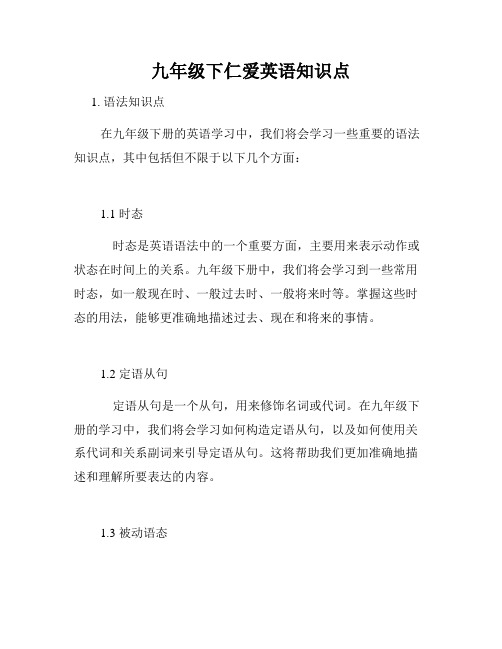
九年级下仁爱英语知识点1. 语法知识点在九年级下册的英语学习中,我们将会学习一些重要的语法知识点,其中包括但不限于以下几个方面:1.1 时态时态是英语语法中的一个重要方面,主要用来表示动作或状态在时间上的关系。
九年级下册中,我们将会学习到一些常用时态,如一般现在时、一般过去时、一般将来时等。
掌握这些时态的用法,能够更准确地描述过去、现在和将来的事情。
1.2 定语从句定语从句是一个从句,用来修饰名词或代词。
在九年级下册的学习中,我们将会学习如何构造定语从句,以及如何使用关系代词和关系副词来引导定语从句。
这将帮助我们更加准确地描述和理解所要表达的内容。
1.3 被动语态被动语态用于强调动作的承受者或者强调动作本身。
在九年级下册中,我们将会学习如何构造被动语态,以及如何正确使用助动词和被动形式的及物动词。
掌握被动语态的用法,能够使我们的表达更加灵活和准确。
1.4 条件句条件句用于表示某个条件下的结果。
在九年级下册中,我们将会学习到不同类型的条件句,如零条件句、一般条件句、虚拟条件句等。
学会运用条件句,能够帮助我们更好地表达假设、愿望、建议等内容。
2. 词汇知识点九年级下册英语学习中,我们将会学习到一些重要的词汇知识点,这些词汇会帮助我们更准确地理解和表达所学的内容。
2.1 同义词与反义词同义词和反义词是词汇中常见的两个概念。
掌握同义词和反义词的用法,能够帮助我们在表达时选择更加准确和恰当的词汇。
2.2 词根与词缀在九年级下册的学习中,我们将会学习到一些常见的词根和词缀。
了解这些词根和词缀的含义和用法,可以帮助我们更好地理解和记忆词汇。
2.3 固定搭配在英语中,有许多词语常常搭配使用,它们的意思往往不能从各个单词的意义推测出来。
在九年级下册的学习中,我们将会学习到一些常见的固定搭配,掌握这些固定搭配,能够使我们的表达更加地道和自然。
3. 阅读技巧在九年级下册英语学习中,我们将会接触到一些文本材料,如短文、文章等。
仁爱英语九年级下 全册 重点短语、重点句型、难点辨析,语法详解
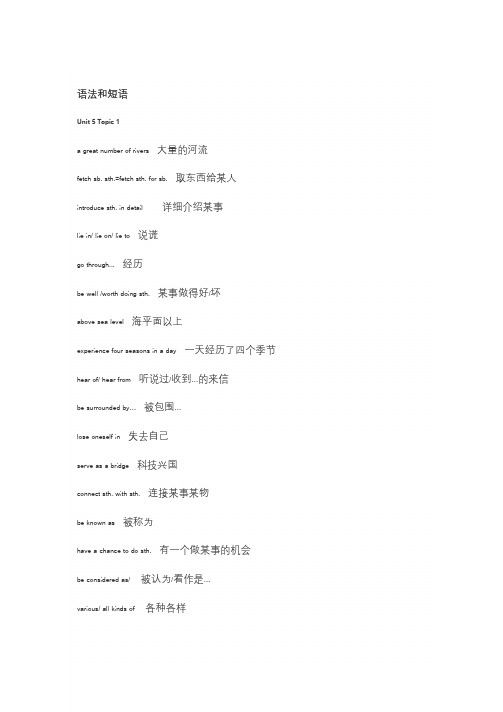
语法和短语Unit 5 Topic 1a great number of rivers 大量的河流fetch sb. sth.=fetch sth. for sb. 取东西给某人introduce sth. in detail 详细介绍某事lie in/ lie on/ lie to 说谎go through... 经历be well /worth doing sth. 某事做得好/坏above sea level 海平面以上experience four seasons in a day 一天经历了四个季节hear of/ hear from 听说过/收到…的来信be surrounded by…被包围…lose oneself in 失去自己serve as a bridge 科技兴国connect sth. with sth. 连接某事某物be known as 被称为have a chance to do sth. 有一个做某事的机会be considered as/ 被认为/看作是…various/ all kinds of 各种各样protect against …保护…be covered with 覆盖Topic 2in the field of education 在教育的领域上receive/get/have a good education 接受/得到一个良好的教育at the age of 55 在55岁search for…搜索in one’s thirties 在某人30岁的时候pass away/die 去世come to an end 结束be proud of/be the pride of/take pride in 以…为豪die of illness 死于疾病in total 总和take an active part in…积极参与…be/become popular with…成为流行…bring down the Qing dynasty 推翻清朝break down from hard work 积劳成疾full of regret 充满遗憾face the danger of…面临的危险wipe out 消灭in my spare/free time 在我的业余时间win a prize 得奖would rather do sth. than do sth./prefer to do sth. rather than do sth. 宁愿做某事而不愿做某事/宁愿做某事而不愿做另一件事fall in love with…爱上…in a tired voice 用疲惫的声音in surprise/surprisingly 在吃惊be ready to help others 乐于助人what’s more 更重要的是pay attention to details 注意细节once upon a time/long long ago 从前/很久很久以前be angry at sth./be angry with sb. 对某事生气。
英语仁爱九年级下册知识点
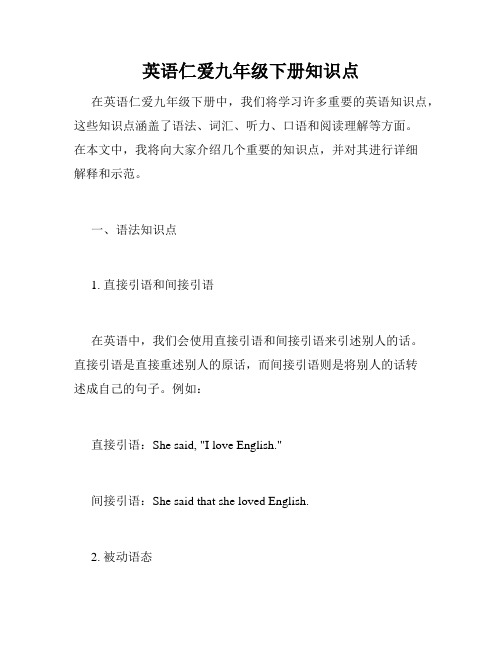
英语仁爱九年级下册知识点在英语仁爱九年级下册中,我们将学习许多重要的英语知识点,这些知识点涵盖了语法、词汇、听力、口语和阅读理解等方面。
在本文中,我将向大家介绍几个重要的知识点,并对其进行详细解释和示范。
一、语法知识点1. 直接引语和间接引语在英语中,我们会使用直接引语和间接引语来引述别人的话。
直接引语是直接重述别人的原话,而间接引语则是将别人的话转述成自己的句子。
例如:直接引语:She said, "I love English."间接引语:She said that she loved English.2. 被动语态被动语态用于强调动作的承受者而不是执行者。
被动语态的构成是:助动词be + 过去分词。
例如:主动语态:Tom grows flowers in his garden.被动语态:Flowers are grown in Tom's garden.二、词汇知识点1. 同义词同义词是指意思相近或相同的词语。
通过学习同义词,我们可以更加丰富自己的词汇量,提高表达的准确性。
例如:happy - gladbeautiful - attractivebig - large2. 反义词反义词是指意思相反的词语。
学习反义词能够帮助我们更好地理解和运用单词。
例如:good - badhot - coldstart - stop三、听力和口语知识点1. 听力技巧在英语听力中,我们需要注意一些技巧来提高听力理解能力。
首先,要多听多练,提高对不同语速和口音的适应能力;其次,可以通过听英语歌曲、看英语电影等方式来提升听力水平;最后,要注意细节信息,如听清关键词和重要细节。
2. 口语表达口语是用于交流和表达的重要技能。
在口语表达中,要注意语音语调的准确运用,流利的句子结构和正确的词汇选择。
此外,多进行口语练习,与他人进行对话,参加英语角或英语演讲比赛等都是提高口语表达能力的有效途径。
仁爱英语九下知识点归纳
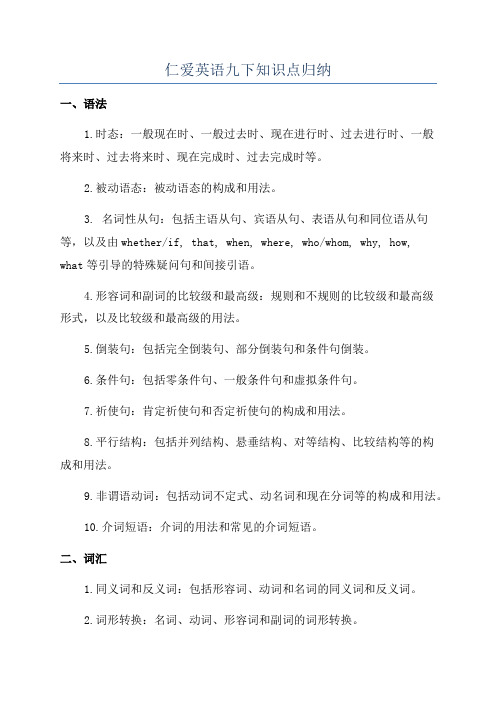
仁爱英语九下知识点归纳一、语法1.时态:一般现在时、一般过去时、现在进行时、过去进行时、一般将来时、过去将来时、现在完成时、过去完成时等。
2.被动语态:被动语态的构成和用法。
3. 名词性从句:包括主语从句、宾语从句、表语从句和同位语从句等,以及由whether/if, that, when, where, who/whom, why, how,what等引导的特殊疑问句和间接引语。
4.形容词和副词的比较级和最高级:规则和不规则的比较级和最高级形式,以及比较级和最高级的用法。
5.倒装句:包括完全倒装句、部分倒装句和条件句倒装。
6.条件句:包括零条件句、一般条件句和虚拟条件句。
7.祈使句:肯定祈使句和否定祈使句的构成和用法。
8.平行结构:包括并列结构、悬垂结构、对等结构、比较结构等的构成和用法。
9.非谓语动词:包括动词不定式、动名词和现在分词等的构成和用法。
10.介词短语:介词的用法和常见的介词短语。
二、词汇1.同义词和反义词:包括形容词、动词和名词的同义词和反义词。
2.词形转换:名词、动词、形容词和副词的词形转换。
3.词组和固定搭配:包括常见的动词短语、介词短语和固定搭配。
4.拓展词汇:通过课文和阅读中的生词来拓展词汇量。
三、阅读理解1.阅读技巧:包括快速阅读、略读和精读等阅读技巧。
2.阅读目的:阅读目的与方法、阅读态度等。
3.推理判断:根据文中的线索进行推理判断。
4.阅读策略:在阅读过程中合理运用策略,如概括大意、寻找关键信息等。
5.阅读材料:包括新闻报道、广告、说明文、记叙文、演讲稿等。
四、写作技巧1.写作结构:包括写作的开头、主体和结尾。
2.写作方法:写作时的选择和组织材料的方法。
3.写作技巧:包括描述、演绎、引用、对比、举例、定义、归纳、递进等写作技巧。
4.书信写作:包括给朋友写信、给老师写信、给亲人写信等。
5.口头表达:包括认为、喜欢、想法、建议和目的等一般句型的用法。
五、其他知识点1.国际音标:了解国际音标的符号和发音。
仁爱版九年级英语下册知识点汇总

仁爱版九年级英语下册知识点汇总Unit 1: Friends- Vocabulary: Words related to friendship and personality traits- Reading: Reading passages about friendship and relationships- Listening: Listening to dialogues and conversations about friends Unit 2: Hobbies- Vocabulary: Words related to hobbies and leisure activities- Grammar: Using the present perfect tense to talk about experiences- Reading: Reading texts about different hobbies and interests- Listening: Listening to people discussing their hobbiesUnit 3: Environment- Vocabulary: Words related to the environment and environmental issues- Grammar: Using modals to express possibility and obligation- Reading: Reading articles about environmental problems and solutions- Listening: Listening to discussions about ways to protect the environmentUnit 4: Health- Vocabulary: Words related to health and healthy lifestyle- Grammar: Using should and shouldn't to give advice- Reading: Reading passages about healthy habits and diseases- Listening: Listening to conversations about health and wellbeingUnit 5: Jobs- Vocabulary: Words related to different professions- Grammar: Using the simple present tense to talk about habitual actions- Reading: Reading texts about various types of jobs- Listening: Listening to interviews and discussions about career choicesUnit 6: Technology- Vocabulary: Words related to technology and electronic devices - Grammar: Using the present continuous tense to talk about future plans- Reading: Reading articles about the impact of technology on society- Listening: Listening to talks and discussions about technological advancementsUnit 7: Travel- Vocabulary: Words related to travel and tourism- Grammar: Using the past simple tense to talk about past events- Reading: Reading passages about different travel destinations and experiences- Listening: Listening to travel stories and conversations about vacationsUnit 8: Dreams- Vocabulary: Words related to dreams and ambitions- Grammar: Using the future tense to talk about future plans and aspirations- Reading: Reading texts about people's dreams and goals- Listening: Listening to people sharing their hopes and dreamsUnit 9: Review- Revision of vocabulary and grammar from previous units- Practicing all language skills: reading, writing, listening, and speaking以上是仁爱版九年级英语下册的知识点汇总。
仁爱英语九下知识点归纳
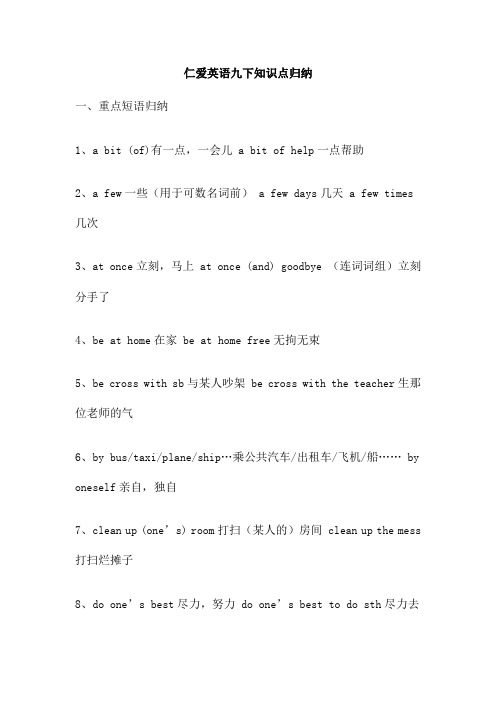
仁爱英语九下知识点归纳一、重点短语归纳1、a bit (of)有一点,一会儿 a bit of help一点帮助2、a few一些(用于可数名词前) a few days几天 a few times 几次3、at once立刻,马上 at once (and) goodbye (连词词组)立刻分手了4、be at home在家 be at home free无拘无束5、be cross with sb与某人吵架 be cross with the teacher生那位老师的气6、by bus/taxi/plane/ship…乘公共汽车/出租车/飞机/船…… by oneself亲自,独自7、clean up (one’s) room打扫(某人的)房间 clean up the mess 打扫烂摊子8、do one’s best尽力,努力 do one’s best to do sth尽力去做某事9、get on (with sb) (与某人)相处 get on well with sb与某人相处得好 get on well with one’s work工作进展顺利10、get to the station到车站 get to the airport到机场 get to the head of the queue到队头 get to know sb认识某人11、give sb a hand帮助某人 give sb a hand with sth帮助某人做某事 give sb a hand in doing sth帮助某人做某事 give sb a call 给某人打 give one’s regards to sb向某人问候 give sb a ring 给某人打 give sb a message给某人留言 give the message to sb 给某人留言12、have a good time (doing sth)玩得高兴,过得愉快 have a good time (in) doing sth做某事玩得高兴、过得愉快 have a good time with sb和某人一起玩得高兴 have a good time at home在家过得愉快 have a good time at work在工作上过得愉快 have a good time on one’s own自己过得愉快13、help oneself to请自便 help oneself to sth请自便吃某菜 help (to) do sth帮助做某事 help sb (to) do sth帮助某人做某事 helpsb with sth帮助某人做某事 help oneself to do sth请自便做某事 help oneself with sth请自便用某物 help with one’s work 帮助工作 help with one’s homework帮助做家庭作业 help to clean up the classroom帮忙打扫教室 help to clean up the sitting-room 帮忙打扫客厅14、keep healthy/fit保持健康 keep healthy/fit by doing sth 通过做某事保持健康 keep healthy/fit on one’s own自己保持健康 keep fit in every way通过各种方法保持健康 keep fit and strong保持健康强壮 keep healthy/fit through exercise通过锻炼保持健康 keep healthy/fit through good eating habits通过良好的饮食习惯保持健康 keep healthy/fit by going to see a doctor通过看医生保持健康15、like this这样(指前面所述内容) like this, like that这样那样(分别) like this and that这样那样(交替) like this kind of thing这样一类东西 like this sort of thing这样一类的东西 like this, that and the other这样那样都来点 like this and that in turn这样那样交替进行16、make one’s way to…前往…… make one’s way through…穿过……,在……中前进 make one’s way home回家 make one’s way to the nearest crossing走到最近的十字路口 make one’s way to the station到车站去 make one’s way to the classroom到教室去 make one’s way through the crowd在人群中前进 make one’s way through the traffic在车流中前进17、not at all别客气,没什么 not at all (用于回答感谢,用在正式场合)不用谢,没什么 not at all (用于回答道歉,意为一点也不介意)没关系,一点也不 not at all (用于表示否定意义或委婉谢绝)决不,一点也不 not at all (用于表示轻蔑、不耐烦等)得了,得了,别胡扯了! not at all (用于表示不在乎、一无所知等)没关系,一点也不 not at all (用于强调程度)非常 not at all (用于加强语气)完全地,彻底地 not at all you are welcome不客气(回答感谢用语) you are welcome不客气(回答道歉用语) welcome 是 you are welcome的缩写形式。
仁爱版九年级下册英语重点知识点梳理

仁爱版九年级下册英语重点知识点梳理Unit 5 Topic 1In this topic。
we will learn some XXX.1.To know little about something means to have almost no understanding of it。
For example。
I know little about Chinese history。
We can also use the phrases know more/a little/nothing about to describe our level of knowledge.2.Places of interest refer to famous tourist ns。
XXX。
For example。
the Great Wall and the Forbidden City are both places of interest in China.3.The birthplace of Chinese culture is a term used to describe the city or n where Chinese XXXXXX.4.If a place attracts ns of tourists。
it means that it is very popular and draws large numbers of visitors。
For example。
the Eiffel Tower in Paris XXX.5.A great number of something means there are many of them。
We can also use the phrase the number of to XXX。
For example。
a great number of people visit the Louvre Museum every year。
- 1、下载文档前请自行甄别文档内容的完整性,平台不提供额外的编辑、内容补充、找答案等附加服务。
- 2、"仅部分预览"的文档,不可在线预览部分如存在完整性等问题,可反馈申请退款(可完整预览的文档不适用该条件!)。
- 3、如文档侵犯您的权益,请联系客服反馈,我们会尽快为您处理(人工客服工作时间:9:00-18:30)。
2019仁爱英语九年级下册知识点
Unit 9
※被动语态
Ⅰ.被动语态的构成形式be+Vt.p.p.
(一).语态是英语动词的一种形式,是用于表示主语和谓语之间的关系。
英语语态分为主动语态(active voice)和被动语态(passive voice)两种。
主动语态是表示主语是动作的执行者。
如:1)Yesterday I parked my car outside the school.
被动语态是表示主语是动作的承受者。
2)A sound of piano is heard in the hall.
(二)被动语态的基本时态变化
在被动语态的句子中,谓语部分的结构是be+Vtp.p.(及物动词过去分词)。
其中be是变量,随时态的变化而变化;动词的过去分词是常量,永远不发生变化。
当然,这仅仅指谓语部分来说。
be动词作为一个独立的谓语动词有自己现在分词(being)和过去分词(been)。
那么,下面我们来看看be在各种时态中的变化形式:被动语态通常为八种时态的被动形式。
以do为例,各种时态的被动语态形式为:
1)am/is/are+done(过去分词)一般现在时
2)has/have been done 现在完成时
3)am/is/are being done 现在实行时
4)was/were done一般过去时
5)had been done 过去完成时
6)was/were being done 过去实行时
7)shall/will be done 一般将来时
8)should/would be done 过去将来时
Ⅱ.一般来说,在我们日常生活中,能用主动语态的时候就尽量不去
用被动语态。
只有在下列情况中我们才用被动语态:
英语里被动语态的使用似乎比汉语要广泛。
英语的被动语态常用在下
列的场合:1)当我们不知道动作的执行者的时候,如:
1.Look!There’s nothing here.Everything has been taken away.
2.My car has been moved!
2)当我们不必提出动作的执行者的时候,如:I was born in 1960.
3)当我们强调或侧重动作的承受者的时候,如:She is liked by everybody.
Ⅲ.特殊的被动结构
1)带情态动词的被动结构:它的固定句式为“情态动词+be+过去分词”。
也有个别带to的情态动词例外,如:ought to 和have to,它们的被动结构就只能在不定式中。
例如:The debt must be paid off before next month那笔债务必须在下个月前付清。
2)带有两个宾语的主动语态变成被动语态
将这种主动态的句子完成被动态的句子,可选两个宾语中的任何一个
作为被动态句子的主语,而将另一个宾语作为“保留宾语”写入被动
态的句中。
但有一点要说明,那就是,如果你选直接宾语作“主语”,有时要在被动态句子的“保留宾语”前加上合格的介词。
因为这些动
词常有两种句式,即:我们能够说give sb.sth.,send sb.sth.,buy sb.sth;我们也能够说give sth to sb,send sth to sb buy sth for sb。
请看下面两种情况的对照:
She sent me a novel on my birthday.
I was sent a novel on my birthday.
A novel was sent to me on my birthday.
3)关于带有复合宾语的主动态变成被动态
如果将带有复合宾语(既:宾语+宾语补足语)的主动语态的句子变成
被动语态的句子,我们只能选择原来句子的宾语作被动语态句子的主语;而这时,原句里的宾语补足语现在就变成被动语态句子的“主语补足语”了。
The story made us laugh.(宾语补足语)
We were made to laugh by the story.(主语补足语)
4)在使役动词have,make,get以及感官动词see,watch,notice,hear,feel,observe等后面不定式作宾语补语时,在主动结构中不定式to要省略,但变为被动结构时,要加to。
Someone saw a stranger walk into the building.
A stranger was seen to walk into the building.
有些相当于及物动词的动词词组,如“动词+介词”,“动词+副词”等,也能够用于被动结构,但要把它们看作一个整体,不能分开。
其
中的介词或副词也不能省略。
例The meeting is to be put off till Friday.
6)非谓语动词的被动语态。
v+ing形式及不定式to do也有被动语态(一般时态和完成时态)。
例,I don’t like being laughed at in
the public.There are two more trees to be planted.。
